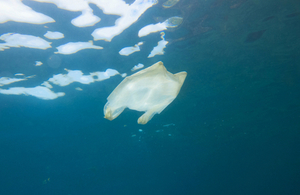Plastic bag sales in 'big seven' supermarkets down 86% since 5p charge
New figures show sales of 5p bags in England continued to fall in 2017/18.

A plastic bag in the ocean
Plastic bag sales in England’s ‘big seven’ supermarkets have dropped by 86% since the Government introduced its 5p plastic bag charge in 2015, helping to tackle the devastating impact of plastic waste on our environment.
New figures reveal customers of the country’s biggest supermarkets bought nearly a quarter fewer plastic bags last year compared to 2016/17 - a decrease of nearly 300 million bags.
This is equivalent to just 19 bags per person in England, compared to 140 bags since the government introduced a 5p charge in 2015 – a dramatic reduction of 86%.
Welcoming today’s figures, Environment Secretary Michael Gove said:
These figures demonstrate the collective impact we can make to help the environment by making simple changes to our daily routines. We want businesses to continue to look at what they can do to help improve our environment to leave it in a better state than we found it.
It is only by working together we will reverse the rising tide of plastic waste finding its way into our rivers, seas and oceans and the catastrophic impact this is having on our marine environment.
Plastic bags have a significant impact on the environment. Government scientists believe plastic in the sea is set to treble in a decade unless marine litter is curbed - with one million birds and over 100,000 sea mammals dying every year from eating and getting tangled in plastic waste.
A recent study by Cefas revealed since the 5p charge on plastic bags was introduced, which has taken over 9 billion plastic bags out of circulation, there has been an estimated 50% reduction in plastic bag marine litter.
Thomas Maes, Marine Litter Scientist at Cefas said:
Every plastic bag not purchased is one which will not end up in our sea, damaging habitats or harming marine life. Since efforts from across Europe came into effect, including the UK’s 5p charge, we have observed a sharp decline in the percentage of plastic bags captured by fishing nets on our trawl surveys of the seafloor around the UK as compared to 2010.
It is encouraging to see the efforts to reduce plastic bag usage by all of society, whether the public, industry, NGOs or government. These figures show that by working together we can tackle the marine litter problem by reducing, reusing and recycling.
The UK continues to be a global leader in protecting our seas, oceans and marine life. The Government has recently announced a range of measures to eliminate all avoidable plastic waste including a world-leading ban on microbeads and proposals to extend the 5p plastic bag charge and explore plastic free aisles in supermarkets.
Earlier this year we announced our intention to ban the sale of plastic straws, stirrers and cotton buds, plans for a deposit return scheme to increase recycling rates of drinks bottles and cans, and launched a call for evidence on using the tax system or charges to address single-use plastic waste.
Today’s figures also reveal that for 2017/18 5p plastic bag sales contributed nearly £60m toward charities and other good causes.
Background
- The seven biggest retailers in the UK are Asda, Marks and Spencer, Morrisons, Sainsbury, The Co-operative Group, Tesco and Waitrose.
- The figure that plastic in the sea is set to treble is taken from the Future of the Sea report.
- The statistic that there has been an estimated 50% reduction in plastic bag marine litter since the 5p plastic bag charge was introduced in 2015 is from Cefas’s Below the Surface report.